
Prior to taking her position as the Commerce and Business Support Councilor of the Tenerife Island Council, Krysten Martín had been the Councilor for Economic Promotion in Santiago del Teide, coordinator of the FAUCA Federation, and manager of Open Commercial Areas, therefore, her knowledge of the sector is beyond doubt. From these areas, she had been a privileged observer of the needs of a very diverse business community, affected by numerous crises, and with multiple determining factors.
Aware of all this, from her position in the Island Council, she is determined to work hand in hand with the municipalities, recovering the necessary collaboration between the Council and the municipalities. “When we arrived, we found an area lacking in content, so we decided to issue the call to be able to diagnose the island of Tenerife. This diagnosis has provided us with interesting data regarding the existence of master plans for Open Commercial Areas, such as the fact that there were only three approved plans in specific areas of three municipalities. What is needed now is to start drafting these master plans to have a roadmap that allows us to plan the territory guiding us towards increasing the competitiveness of the commercial fabric.”
The Commerce and Business Support area has doubled the budget from the previous year, allowing for the continuation or creation of new lines of business support, “we are not going to break with anything, but we will change the content. The strategy lies, above all, in supporting the expenses derived from the opening of establishments, focusing on rural areas with fewer than 20,000 inhabitants and not only on the opening of the first establishment, but also in the case of a second opening in another municipality.”
Commerce and Business Support has doubled last year’s budget
[–>
Since the Canary Islands Government has launched the flat rate for the first year, Martín explains that, to add advantages, “we are going to take advantage of and allow for the justification of the subsidy with other aspects such as the establishment’s project work, municipal fees related to the prior communication of the start of activity, etc., which are expenses related to the opening of the establishment.”
The councilor explains that they will not only support newcomers but also those already established, “we will help with the renovation and modernization of commercial spaces and standardization of the image of commercial establishments. The expenses will be more related to, for example, facades, improvements in awnings, tables, chairs, umbrellas, and accessibility, which I think is very important. All this in collaboration with the municipalities, which must comply with the criteria of municipal regulations that regulate, for example, all aspects of ornamental details, which must focus on characteristics specific to the environment.”
This call also implies that the Council can intervene in the acquisition and installation of urban furniture in publicly owned spaces, as long as they are included in the Open Commercial Area space and contribute to the homogenization and aesthetic harmonization of the commercial area. “This will undoubtedly be a fundamental tool to have renovated, modern, and sustainable commercial spaces.”
To encompass all this strategy under one brand, the Tenerife Island Council recently presented “Now You See Me,” an umbrella slogan with an ideogram representing the consumer, with open arms, the C representing commerce and Open Commercial Areas alongside some drawings “which are not just locations, but a representation of the different types and sizes of companies because the concept of commerce nowadays has evolved, moving towards a more commercial mix idea where we find commerce but also restoration, leisure, services, etc.”
The area will be able to intervene in the acquisition and installation of urban furniture
[–>
Among the projects for the improvement and modernization of commerce, Martín excitedly announces the celebration of the first Congress of Commerce and Business Support, which will take place in April in the South of the Island, although she does not want to reveal more details yet “it will be a very interesting forum in which to share all the factors that affect commerce, in order to combine efforts and create synergies between the private and public sectors.”
Regarding the economic situation of the sector, the councilor states that “I like to be realistic about the current situation, but what I am told is that the Carnival campaign was the same or better than the previous year. The difference is that, with the rise in raw material prices, they have to pay more, so the profit does not increase or is even tighter, but consumption has been the same or even higher than the previous year.”
Another problem that entrepreneurs are facing and that they convey to the councilor is beyond the uncertainty about the current landscape, the lack of qualified personnel for the jobs they need to fill.















